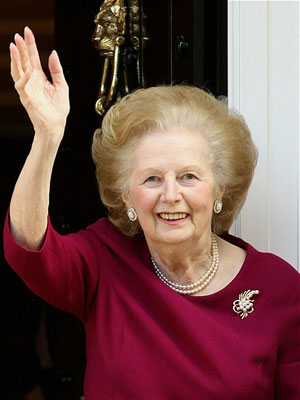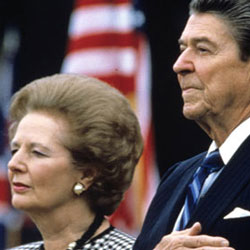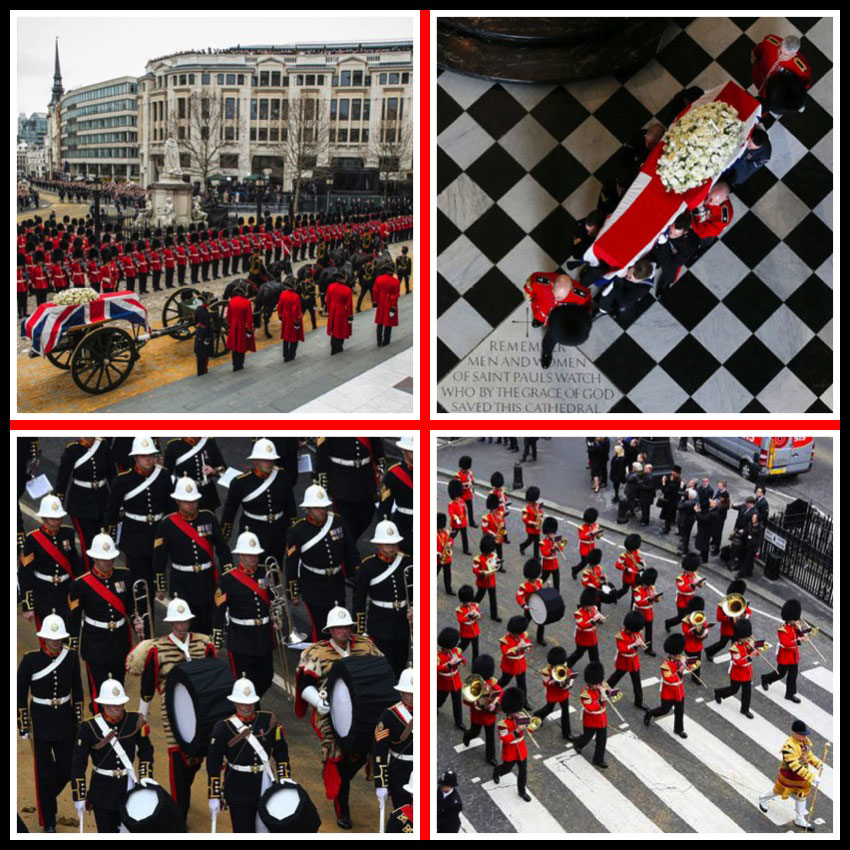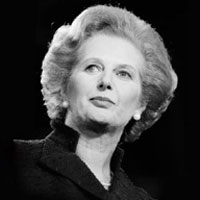Margaret Thatcher
1925-2013
By Andy Ross
April 9, 2013
Margaret Thatcher set the British economy to rights and helped the
United States and the Soviet Union to end the cold war. She believed
that personal and economic freedom go together, that personal
responsibility and hard work are the way to prosper, and that market
democracies must stand firm against aggression.
Mrs Thatcher
was the first female prime minister in the UK. Hard driving and
hardheaded, she led her Conservative party to three straight
election wins and held office from May 1979 to November 1990. In
1979, the UK was crippled by high unemployment, nationalized
utilities, punitive tax rates, foreign exchange controls, a trade
union stranglehold, and a sleepy financial sector. By 1990, all of
this had been turned around. She broke the power of the labor
unions, broke up nationalized industry, redefined the role of the
welfare state, and advanced the free market.
Margaret Roberts
was born in 1925, in Grantham, 100 miles north of London. Her family
lived in a flat above a grocery store owned by her father. Her
parents reared their two daughters to take personal responsibility,
work hard, and uphold traditional moral values. Margaret
matriculated at Oxford and became president of the Oxford
University Conservative Association in 1946. She went on to work as
a chemistry researcher and study law.
In 1949 she met Denis
Thatcher, a rich businessman and former artillery officer, and they
married in 1951. Mrs Thatcher gave birth to twins in 1953. Later
that year, she was admitted to the bar. She then devoted herself to
politics. She was finally elected in 1959 as MP for Finchley in
north London. In 1970, Conservative PM Edward Heath appointed her as
secretary for education.
The British economy sank ever
deeper into decline, inflation surged and industrial strikes
spread, and Heath imposed wage and price controls. His U-turn angered
the Tory right. He lost a general election in 1974, and in 1975 the
Conservative party elected a new leader. Thatcher was a formidable
political warrior, and as a young minister she cut a strong figure,
but her election as leader was a surprise.
For the next four years,
as a Labour government ran the country, Thatcher fought to reshape her
party. She was guided by the firm principles of personal
responsibility, economic freedom, and smaller government. Her
economic ideas came from Friedrich von Hayek and Milton Friedman.
She pledged to attack inflation, denationalize basic industry, and
curb union power.
By then, Britain was the sick man of
Europe. The "winter of discontent" starting in 1978 brought mass
strikes that dragged into 1979, and Labour PM James Callaghan had to
call a general election. Margaret Thatcher became the new PM in May with
these words: "Where there is discord, may we bring harmony. Where
there is error, may we bring truth. Where there is doubt, may we
bring faith. And where there is despair, may we bring hope." But she
also warned: "Things will get worse before they get better."
In foreign affairs, she stood up to the European Economic Community
and said the UK paid out more than it got back in benefits. In late
1979 she said after negotiations at an EEC summit: "We are not
asking for a penny piece of Community money for Britain. What we are
asking is for a very large amount of our own money back."
By
October 1980, the UK faced economic disaster. At the Conservative
party conference that month, moderates saw electoral defeat staring
them in the face, but Thatcher declared: "I am not a consensus
politician, I am a conviction politician." She told them she would press
forward with her policies: "You turn if you want to. The lady's not
for turning."
In the summer of 1981, discontent boiled over
into days of rioting in the inner cities of London, Liverpool,
Manchester, and Bristol. Thatcher called for greater police powers,
but she was forced to compromise. She later said it was her worst
year in office.
Thatcher was relentlessly opposed to Communism. Her hostility to the Soviet Union fed
fears of nuclear war, and the Soviet press called her the Iron Lady.
She agreed with President Jimmy Carter to
deploy American nuclear cruise missiles in Britain in response to a
Soviet buildup in Eastern Europe. In the early Reagan years, despite
big demonstrations in Britain and across Europe, the European NATO
allies accepted deployment of cruise and Pershing missiles.
In April 1982, Argentine military forces
invaded the British Falkland Islands. As the United States and other
allies pushed for talks to avoid bloodshed, The Iron Lady knew where she
stood: "We will stand on principle, or we will not stand at all."
She ordered a Royal Navy armada to sail south and land British Army
paratroopers and Royal Marines to retake the islands. They did, in
an astonishing display of military prowess. Some 250 British
servicemen and over a thousand Argentines were killed in the
fighting. For Thatcher it was a great victory, and she became world
famous.
When Thatcher called an election in June 1983, Labour party leader
Michael Foot campaigned for a unilateral nuclear disarmament,
withdrawal from the European Economic Community, further nationalization of
industry, and a huge jobs program. Opponents called his manifesto
the longest suicide note in history. The Conservatives won by a
landslide.
Thatcher then broke the power of the trade unions.
She picked a fight with the powerful National Union of Mineworkers.
The coal mines had been nationalized in 1947 and had become
unprofitable and outdated. In 1984, the government announced
plans to shut down several mines and to decimate the workforce. In
response, Marxist NUM boss Arthur Scargill called a nationwide
strike. Night after night, TV news showed hundreds of miners
battling police. The strike lasted almost a year, but Thatcher
refused to surrender and fought it to the bitter end.
She
refused to be bowed by terrorism. Despite the sectarian violence in
Northern Ireland, Thatcher saw the troubles there as intractable and
refused to deal with the Irish Republican Army. After the IRA tried
to assassinate her at the 1984 Conservative Convention in Brighton,
killing five people, she insisted on continuing the conference the
next day: "The fact that we are gathered here now, shocked, but
composed and determined, is a sign not only that this attack has
failed, but that all attempts to destroy democracy by terrorism will
fail."
Thatcher pushed harder to realize her dream of popular
capitalism. The sale of state-owned industries shifted almost a
million jobs into the private sector. Over a million public housing
units were sold to their occupants. Chancellor of the Exchequer
Nigel Lawson announced in 1985 that for the first time in a
generation the Treasury would balance the budget.
Across the
Atlantic, Ronald Reagan cheered the British turnaround. He then
invaded the British Commonwealth nation of Grenada in the wake of a
Communist coup there. Thatcher protested at not being informed
in advance, but their friendship was strong enough to survive the
spat.
During the Reagan years, the Soviet Union began to show
signs of economic failure. The Reagan administration raised the
pressure by moving ahead with plans for the Strategic Defense
Initiative, also known as Star Wars.
Thatcher was one of the
first Western leaders to recognize that the new Soviet premier Mikhail Gorbachev was
different from his Kremlin predecessors: "I like Mr Gorbachev. We can do business together." Her
rapport with him and her friendship with Ronald Reagan made her a vital link between the White House and the Kremlin in
their negotiations to end the cold war.
Gorbachev was opposed to SDI. Thatcher was skeptical
too and told Reagan: "I know it won't work." But she changed her
mind after he told her Britain would get some of the research and
develop work for it. In December 1984, she helped to assure the
Soviets that SDI would not get in the way of arms control talks.
In Iceland in October 1986, Reagan and Gorbachev almost agreed to ban nuclear weapons altogether. But the talks fell
apart when Gorbachev insisted that Reagan first drop Star Wars. Many
people were relieved. Mrs Thatcher: "The fact is that nuclear
weapons have prevented not only nuclear war but conventional war in
Europe for 40 years."
In April 1986, after terrorist attacks
in Western Europe, Reagan sought permission to launch American
warplanes from bases in Britain for attacks on Libya. Thatcher was
happy to oblige. She said terrorism demanded a united response.
During those years, Thatcher's domestic legacy included
liberalization of exchange controls, a huge cut in top income tax
rates, liberalization of labor markets, transformation of the legal
position of trade unions and defeat of militant organized labor,
sale of much of the public housing stock, privatization of most
nationalized industries, and the liberalization of finance. After
she deregulated the City of London in 1986, the UK became a global
center for finance and investment.
She aired a principle of
her philosophy in 1987: "There's no such thing as society. There are
individual men and women and there are families. And no government
can do anything except through people, and people must look after
themselves first. It is our duty to look after ourselves and then,
also, to look after our neighbors."
Thatcher was forced to
retreat from plans to privatize the water industry and the National
Health Service, replace college grants with a student loan program,
cut back pensions, and revamp the social security system. But the
economy continued to work in her favor. She won her third general
election in June 1987. Wall Street crashed in October.
Thatcher became increasingly strident and disruptive toward Europe.
In 1988 she said: "We have not successfully rolled back the
frontiers of the state in Britain only to see them reimposed at a
European level with a European superstate exercising a new dominance
from Brussels."
She believed that linking the pound to other
currencies would erode British sovereignty. At the Madrid EEC summit
in 1989, leading Tories told her the UK must join the Exchange Rate
Mechanism. But she resisted the idea that they could solve British
economic problems by trying to align sterling with other currencies:
"You can't buck the market."
Chancellor Lawson still tried to
align sterling with the ERM by pegging the pound to the relatively
stable German mark. Meanwhile, easy credit was fueling inflation,
and Lawson refused to raise interest rates. When Thatcher demanded
he relent, Lawson raised the rates, which threw Britain
into recession. Lawson resigned in October 1989.
In 1990, to
make local authorities more accountable for how they spent tax
money, Thatcher pushed through a "poll tax" on all adult
residents of a community. The tax was manifestly unfair and deeply
unpopular. Protests flared into riots, and the Tories lost faith in
their leader.
In the fall of 1990, the Iron Lady bolstered
President George H.W. Bush in his efforts to build a UN coalition to
oppose the Iraqi invasion of Kuwait. She told him: "George, this is
no time to go wobbly."
That November, the Tories revolted.
Deputy PM Geoffrey Howe and former defense minister Michael
Heseltine led a rebellion against her. She fought to the bitter end:
"I fight on. I fight to win." But she was forced to resign, and left
10 Downing Street in tears. She went on to sit in the House of Lords
as Baroness Thatcher of Kesteven.
Mrs Thatcher once said: "My
task will not be completed until the Labour party has become like
the Conservative party, a party of capitalism." With the election of Tony Blair
in 1997, her task was completed.
The 2008 crash
shook the economic legacy of Thatcherism. Economic failure haunts
the UK again. As the German example has shown, economic dynamism is
possible without squandering social cohesion. Her legacy is not
order but freedom. Her aim was "to change the heart and soul" of
people in Britain. The change was necessary, and it stands.
For all her faults, Margaret Thatcher was the greatest British prime
minister since Winston Churchill.
With contributions from
Janan Ganesh,
Joseph Gregory,
Boris Johnson,
Tom Rogan, and
Martin Wolf.
The pompous state funeral for Margaret Thatcher on April 17 featured a display of imperial props not seen since the funeral of Winston Churchill in 1965 or the Queen Mother in 2002.
Thatcherism
When Margaret Thatcher came to power, she faced a Britain still dreaming of
being a world power but blocked by the power of the trade unions. With
aplomb, she neutered the unions and woke up the UK. But she also set up
Britain for the growth of financial market capitalism and drove it to the
brink of deindustrialization. She discredited the EU in the UK. She helped
Ronald Reagan win the cold war, but on German reunification she was cold.
— Die Welt
The social coldness that is making Britain
shiver once again today is her legacy. After her forced resignation in 1990,
she was asked what she had changed as leader of the country, and she
answered: "Everything." That crowing answer is the key to understanding her.
She was always a rebel.
— Süddeutsche Zeitung
Thatcherism stands for
deregulation, privatization, and the destruction of the welfare state. No
one divided British society as much as Margaret Thatcher. She destroyed the
trade unions and ruined the public sector. As soon as she gained office, she
lowered the top tax rate from 83% to 60% and raised VAT from 8% to 15%.
During her time in office she used up more than 100 ministers and surrounded
herself with yes-men. Only one women made it into her cabinet.
—
Die Tageszeitung
Thatcher liberalized the British financial sector. The move
triggered the massive boom of the City of London. Between 1993 and 2006, the
British economy grew by 2.8% on average per year while unemployment fell
from 9% to 4%. But since then, the world has learned that faith in free
markets was a mistake. The Big Bang was followed by the Big Bust. Today
prime minister David Cameron and his finance minister George Osborne look
with envy at the industrial heart of the German economy.
—
Handelsblatt
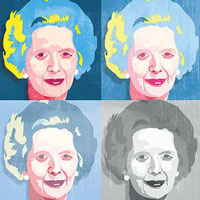
Streep Plays Thatcher
By
David Owen
The Independent, Jaunary 7, 2012
Edited by Andy Ross
Meryl Streep's portrayal of Margaret Thatcher is brilliant. The film takes
us into the cabinet room, where we witness the Iron Lady's open display of
personal contempt for Sir Geoffrey Howe, previously her Chancellor of the
Exchequer and Foreign Secretary.
Contempt was in Greek mythology the
least attractive feature of the hubris of leaders who had become
overwhelmingly confident in their own judgement and dismissive of the views
of others. The symptoms and signs of it I have called "hubris syndrome".
Hubris is followed by nemesis, and so it turned out for Margaret
Thatcher. On 13 November 1990, Howe made a personal statement to the
Commons, a full-frontal attack, the speech of an assassin. But I very much
doubt that hubris syndrome is an early sign of dementia.
Many of
those dedicated to guarding the flame of Thatcherism resent this film. They
do not like its framing the story with an old lady whose mind is being
progressively destroyed. For them she must remain a heroine. But the general
public is becoming ever more aware of brain disease.
Ronald Reagan
was nearly 70 on taking office in 1981. Many Americans thought he was
suffering from dementia while still in power. In November 1994, he announced
that he was one of a million Americans afflicted with Alzheimer's disease.
He died in 2004, much respected.
Margaret Thatcher's political legacy
is formidable. There is no need to fear Streep's depiction of her dementia.
The film gives her a touching humanity. Dementia can afflict the brightest
and the best.
Thatcher Was Right
Daniel Finkelstein
The Times, January 11, 2012
Edited by Andy Ross
Meryl Streep plays Margaret Thatcher in The Iron Lady. It is an astonishing
performance and it is embedded in a rather good film. But in paying homage
to Mrs Thatcher's strength of character, the film misses the most important
feature of her resolve and determination: it was put to the service of the
right ideas.
I found Mrs Thatcher's public style arrogant and
unyielding. But on the very big questions she faced — the economy, the trade
unions, the Falklands and the Cold War — she was right and her determination
was an asset. Otherwise her resolve was disastrous.
The Labour
governments that preceded Mrs Thatcher's had many strong characters in them.
But they were in thrall to an intellectual error — that the world was small
enough to be amenable to central planning and control. It was not strength
but sense that marked out the Thatcher regime.
In the Cold War she
was called The Iron Lady by the Red Star newspaper of the Soviet Army
because of her anti-Soviet rhetoric. It was intended it as an insult. She
understood immediately that unflinching opposition to the Soviet Union was
something to be proud of. When leadership is right, it is good that it is
strong.
Margaret Thatcher
By Charles Moore
Anne Applebaum
The Telegraph, 27 April 2013
Edited by Andy Ross
Charles Moore had unprecedented access to Margaret Thatcher's private
papers, on condition that nothing be published until after her death. The
thoroughness of the research, the hundreds of interviews, and above all the
access to her family and friends, enabled Moore to produce a multi-faceted
picture of a compelling and unusual life. It works perfectly. Moore's
Thatcher will now become the definitive account.
|
|
|

